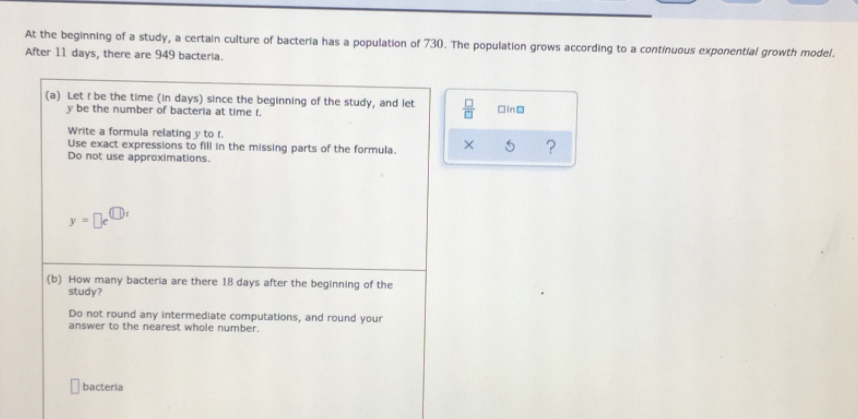At the beginning of a study, a certain culture of bacteria has a population of 730. The population grows according to a continuous exponentlal growth model. After 11 days, there are 949 bacteria. (a) Let t be the time (In days) since the beginning of the study, and let y be the number of bacteria at time t. Oino Write a formula relating y to t. Use exact expressions to fill in the missing parts of the formula. Do not use approximations. (b) How many bacteria are there 18 days after the beginning of the study? Do not round any intermediate computations, and round your answer to the nearest whole number. O bacteria
At the beginning of a study, a certain culture of bacteria has a population of 730. The population grows according to a continuous exponentlal growth model. After 11 days, there are 949 bacteria. (a) Let t be the time (In days) since the beginning of the study, and let y be the number of bacteria at time t. Oino Write a formula relating y to t. Use exact expressions to fill in the missing parts of the formula. Do not use approximations. (b) How many bacteria are there 18 days after the beginning of the study? Do not round any intermediate computations, and round your answer to the nearest whole number. O bacteria
Linear Algebra: A Modern Introduction
4th Edition
ISBN:9781285463247
Author:David Poole
Publisher:David Poole
Chapter6: Vector Spaces
Section6.7: Applications
Problem 14EQ
Related questions
Question

Transcribed Image Text:At the beginning of a study, a certain culture of bacteria has a population of 730. The population grows according to a continuous exponentlal growth model.
After 11 days, there are 949 bacteria.
(a) Let t be the time (In days) since the beginning of the study, and let
y be the number of bacteria at time t.
Oino
Write a formula relating y to t.
Use exact expressions to fill in the missing parts of the formula.
Do not use approximations.
(b) How many bacteria are there 18 days after the beginning of the
study?
Do not round any intermediate computations, and round your
answer to the nearest whole number.
O bacteria
Expert Solution
This question has been solved!
Explore an expertly crafted, step-by-step solution for a thorough understanding of key concepts.
This is a popular solution!
Trending now
This is a popular solution!
Step by step
Solved in 2 steps

Recommended textbooks for you

Linear Algebra: A Modern Introduction
Algebra
ISBN:
9781285463247
Author:
David Poole
Publisher:
Cengage Learning

Algebra & Trigonometry with Analytic Geometry
Algebra
ISBN:
9781133382119
Author:
Swokowski
Publisher:
Cengage

Linear Algebra: A Modern Introduction
Algebra
ISBN:
9781285463247
Author:
David Poole
Publisher:
Cengage Learning

Algebra & Trigonometry with Analytic Geometry
Algebra
ISBN:
9781133382119
Author:
Swokowski
Publisher:
Cengage